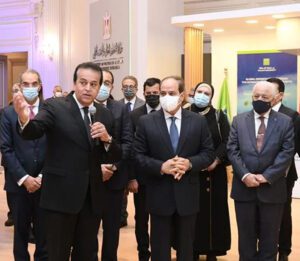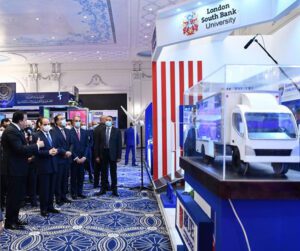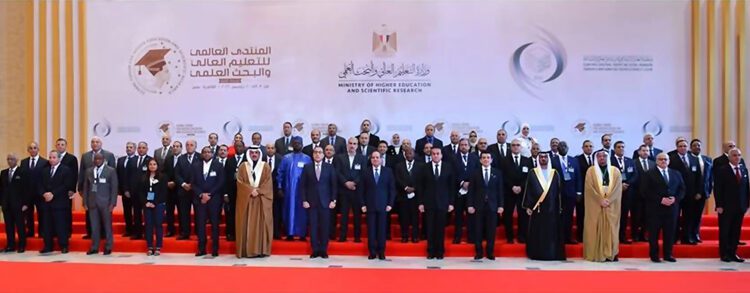Cairo- Egypt’s President Abdel Fattah El Sisi stressed the importance that all people have better access to good education, considering it a fundamental human right for everyone. He also asserted the necessity of providing quality education in all member states of the Islamic World Educational, Scientific and Cultural Organisation (ICESCO).
Speaking at a panel discussion under the theme of “Challenges of Future Jobs from a Global Perspective”, the president said “Getting good education is a fundamental human right for everyone”, Presidency Spokesman Ambassador Bassam Radi said in a statement.
The event was held as part of the second edition of the Global Forum for Higher Education and Scientific Research (GFHS) and the ISESCO general conference, which was held on Wednesday at the New Administrative Capital with the participation of international universities and organisations.

During the event, the president highlighted Egypt’s efforts over the past few years to establish new universities in partnership with major international universities and higher educational institutions.
President Sisi also stressed the necessity that all Islamic countries be aware of destructive and nonsensical extremist thought, warning that narrow-mindedness, bigotry and prejudices could be detrimental to the future of peoples and their civilisations.
The president said that extremism has obstructed accomplishing development programmes in many developing states.
He added that the quality of “education for all” in developing countries has not been the same as that in developed ones. That’s why Egypt is now keen on introducing joint programmes with international universities, he underlined.

“We want to keep up with the latest developments in education so please co-operate with us,” the Egyptian president said addressing Western educational establishments.
”The state will fight for the achievement of real education in Egypt; hence the importance of education in nation building,” President Sisi said.
He called on the major universities in the world to help Egypt to have real knowledge and education with the same standards and principles applied in these universities.
”A male or female student wishing to achieve a level of education that matches the requirements of modern age must do his utmost to meet the standards necessary for admission to these colleges,” Ambassador Radi quoted President Sisi as saying.
“As a modest contribution from Egypt, we will offer 100 education opportunities free of charge for world talents in Egyptian universities, as we seek to establish an international reputation for these institutions,” President Sisi said.
“We can do more than that if our efforts are concerted to establish a fund worth billions of dollars to educate talents,” he added, urging the developed world to help these countries to provide quality education.

In his speech during the GFHS Global Forum, Minister of Higher Education and Scientific Research Khaled Abdel-Ghaffar said Egypt is acting to maximise investment returns from university education and scientific research in light of the global digital transformation.
”Egypt has paid top priority to achieve comprehensive reform of the different aspects of the higher education system in a way that would lead to further economic growth, as well as psychological and moral reconstruction,” he added.
He told the gathering that Egypt is working in coordination with all countries to achieve integration, exchange expertise and benefit from all success stories.
This forum brings together ministers, ambassadors, scientists and researchers from many countries with the aim to discuss a number of education and technology files, Abdel-Ghaffar said, noting that it is a serious attempt to link the present with the future and overcome challenges facing joint action that would contribute to human progress.
He added that his ministry is eyeing multilateral co-operation as a means to achieve the goals outlined in national strategies and plans – to bring higher education and scientific research up to code.
Abdel-Ghaffar thanked President Sisi for sponsoring higher education and scientific research in Egypt and for attending the second edition of the GFHS.
For his part, Salem bin Mohamed al Malek, director general of ICESCO, said his organisation adopts basic points in its new visions and plans and seeks, along with member states, to adopt a new course reminiscent of the civilisation created by the ancestors.
He called for building partnerships to adopt new academic and scientific policies coping with the industrial intelligence and investments in space sciences.
Malek referred to achievements of a number of universities in some ICESCO member states, particularly Saudi Arabia, where four universities came in top world positions.
He also spoke of a number of Egyptian universities taking leading positions in global and regional ratings.
”Hopefully, more universities in ICESCO member states would be included in these lists by 2030,” Malek said.
He spoke highly of higher education progress in Egypt, which is taking confident steps towards achieving its 2030 vision as outlined by the Egyptian government under the auspices of President Sisi.

He expected more Egyptian universities to be added to international ratings, especially new generation universities, which are concerned with knowledge economies.
Malek reiterated ICESCO’s willingness to build smart partnerships that could enable universities to achieve such noble goals.
He thanked the Egyptian president, government and people for acting to render this forum successful.
At the end of the forum, the ICESCO director general handed over to President Sisi the shield of “Tahya Misr…The New Republic”.
Attended by prominent Islamic figures from international universities and organisations, the forum takes up many files including the needs of local and international labour markets in light of the coronavirus pandemic and the necessary skills needed for a rapidly changing labour market.






Discussion about this post